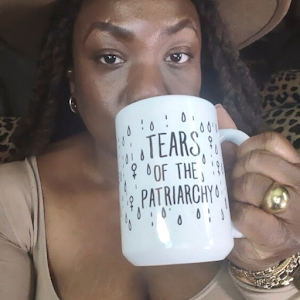 |
| Source: globalgirlmedia.org |
Current media trends are low on diversity and seem to eschew the importance of hearing and reading perspectives from pundits who are actually equipped to properly tackle certain topics with integrity and experience. Often, the voices of women and girls of color (trans and cis, LGBQ and heterosexual) are erased from important national discussions, especially surrounding social justice issues and media imagery.
Prime example: many people either don’t know, or are still smarting from the fact, that the Black Lives Matter movement and term was started and coined by three Black women activists—Alicia Garza, Patrisse Cullors, and Opal Temeti. The mainstream media doesn't do much to help reiterate that fact, opting to paint a narrative of a bumbling activist operation. Not to mention, the Black Lives Matter message and protests are often co-opted without proper attribution and credited to male activists, some of whom are, reportedly, prone to speaking over the voices of the women at the forefront of many of the protests that have taken place since Ferguson. It’s also not uncommon for girls of color—especially Black girls—to be placed on the back-burner during the creation of public initiatives to help save men and boys of color, even though girls of color face just as many challenges and would benefit from mentor-ship programs that'd help enrich their lives.
Prime example: many people either don’t know, or are still smarting from the fact, that the Black Lives Matter movement and term was started and coined by three Black women activists—Alicia Garza, Patrisse Cullors, and Opal Temeti. The mainstream media doesn't do much to help reiterate that fact, opting to paint a narrative of a bumbling activist operation. Not to mention, the Black Lives Matter message and protests are often co-opted without proper attribution and credited to male activists, some of whom are, reportedly, prone to speaking over the voices of the women at the forefront of many of the protests that have taken place since Ferguson. It’s also not uncommon for girls of color—especially Black girls—to be placed on the back-burner during the creation of public initiatives to help save men and boys of color, even though girls of color face just as many challenges and would benefit from mentor-ship programs that'd help enrich their lives.
Additionally, media portrayals of missing, abused and murdered women and girls of color is often biased or not considered newsworthy enough, unless the victims' lifestyle can be exploited and used against them in some way. When victims’ identities aren't being completely erased, some reports often vilify and fail to humanize them, or will offer a lackluster account of events. As was the case with murdered Tampa teenagers Angelia Mangum, 19, and Tjhisha Ball, 18, and with Canadian law enforcement's lack of concern for the 230 indigenous women that have gone missing or have been murdered.
Needless to say, the Global Girl Media Network—a 501 (c) (3) non-profit organization—is looking to carve out a niche and change the face of media. Founded by filmmakers Amie Williams and Meena Nanji, and comprised of a coalition of broadcasters and journalists, Global Girl Media works to empower young women and girls between the ages of 14-22 from under-served communities, who aren’t often given the platform to tell their stories. Global Girl Media employs the use of media, leadership and journalism training to enable mentees to counter negative and gendered media bias towards women and girls, and to bridge the gender, class and racial divide in digital media.
So far, Global Girl Media have young reporters operating from Oakland, Los Angeles, Chicago, Morocco, UK, Kosovo and South Africa. With the help of sponsorship and education, these girls have been able to produce, report, write and signal-boost their stories through various platforms, including social media, radio and TV broadcasts, and forge partnerships with over 200 media outlets.
Global Girl Media-Oakland (started in June 2014) is currently raising money to help connect and create opportunities for young women in their community through storytelling and journalism, and to help launch their ‘Girls Speak Oakland’ summer program.
While emerging media properties like allDigitocracy (via projects like their Beacon Reader How’d You Get That (Media) Job? drive) and the UK-based Media Diversified (which recently launched an Experts Directory) have helped advocate for more diversity in media, adding young female voices like those of GGM Network to the media fabric, is equally as important. A perusal of the GGM YouTube channel presents a wide array of riveting news features about issues like teen sex trafficking in Oakland, eco-feminism, global gender equality and teenage survivors of domestic violence.
You can support Global Girl Media-Oakland by donating to their crowdfunding page and helping spread the word.
You can support Global Girl Media-Oakland by donating to their crowdfunding page and helping spread the word.









No comments
Post a Comment